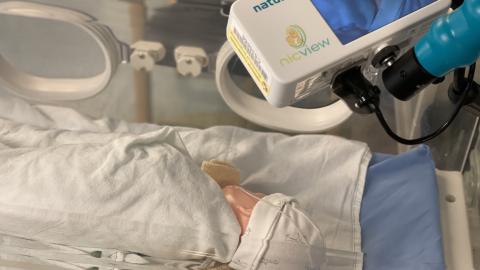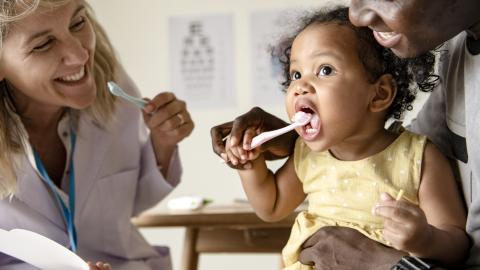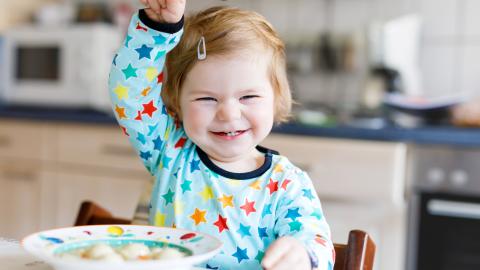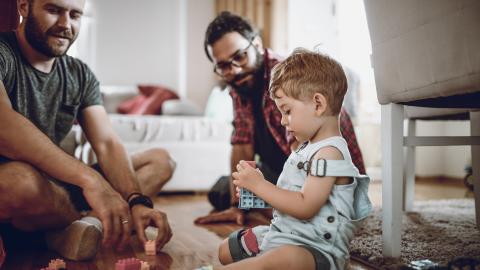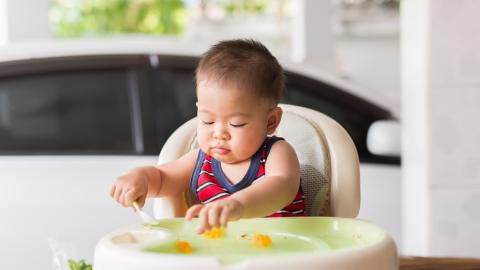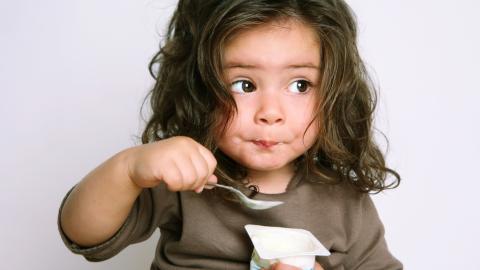Resource
Growth and development, preschoolers

Helping your preschooler grow in a healthy and positive way is one of the most important jobs a parent will do. As you have learned by now, each child grows and develops in their own way and as a parent it is up to you to provide the environment and support to help your child.
Bedtime and sleep
Sleep is an important part of your child's growth and development, and children who get enough sleep tend to be happier and demonstrate good behaviour. It may be a struggle to get your toddler to sleep sometimes, especially after a change in routine like an illness or vacation. However, there are several ways you can encourage and foster good sleep habits in your toddler.
- Sleep and Your Toddler (1 – 3 year olds)
- Night waking - HealthLink BC
- Healthy sleep habits for toddlers - HealthLink BC
- Time for bed - HealthLink BC, also available in: Chinese, Farsi, French, Korean, Punjabi, Spanish, Vietnamese
Tips to help your toddler sleep
- Establish a routine. Try to have regular meal, nap and bedtimes every day. Create a calming bedtime routine that your child will look forward to at the end of each day.
- Encourage physical activity. Toddlers have a lot of energy so providing time to play outside and move their bodies every day is important. You can go to a local playground, or check on programs and activities available through your community centre to find different options.
- Create a calm environment at bedtime. Make sure the temperature of your child's room is comfortable, and that the room is dark. Quiet, soothing music or a nightlight might help as well.
- Provide a comfort object for your child. Many children have a favourite stuffed animal or blanket that helps them settle down when it is time to sleep.
- Make sure the bed your toddler is sleeping in is the right one. If your toddler climbs out of their crib a lot or objects to having the sides up, it may be time for a toddler bed.
If you still have concerns about your toddler's sleep habits, talk to your Public Health Nurse or family doctor.
Dental care for preschoolers
By 3 years old, your preschooler will likely have all 20 baby teeth. Some baby teeth do not fall out until about age 12. Your preschooler should be seeing a dentist regularly. If you haven't gone yet because the cost is a concern, you may be eligible for basic dental care through the BC Healthy Kids Program.
Keeping your preschooler's teeth healthy
It's very important to brush them twice a day. Good habits now will prevent tooth decay later in life. By taking good care of your preschooler's baby teeth, you are also taking good care of their adult teeth.
- Brush your child's teeth two times per day - Make brushing part of your daily routine
- Use a small, soft toothbrush - Let your child choose their toothbrush
- Use a pea-sized amount of fluoride toothpaste - Try different toothpaste flavours until you find one your child likes.
- Make brushing teeth fun - Sing a song, tell a story or listen to music.
-
If your preschooler is excited to brush their own teeth, it's important to encourage them. You want them to have as much fun as possible. However, it's important for you to have a turn brushing their teeth too. Children under 6 don't yet have the skills to brush their own teeth well enough so you will need to brush their teeth for them.
Mental health for preschoolers
Your toddler's social and emotional development is definitely taking shape right now as you see their personality really emerge. This means you may see them start to assert their independence more and use words like "No!" and "Mine!" more often. This is very typical in toddlers, and now is a good time to help your child learn to express their feelings and emotions in healthy ways to nurture good mental health practices for the future.
- Toddler development: Social and emotional - HealthLink BC
- Stress management: Helping your child with stress - HealthLink BC
Tips to help your child with stress
- Talk to them about feelings and healthy ways to express them. If your child is laughing, saying something like, "Your smile tells me you are happy" is a good way to help them understand social cues and understanding other people's emotions.
- Provide opportunities to meet other children. They may prefer to play side by side rather than with each other, but this is a good start to understanding how to interact with other people.
- Use play and every day routines to talk about family and friends. Knowing they are not alone in the world is important for children.
- Provide ways to deal with emotions. For example, if they are mad you can ask them if they would like to tell you what is wrong or be left alone for a little while before talking about it.
Understanding mental health
Any drastic changes in your child's mood, behaviour or thinking may indicate they are experiencing some type of mental health challenge. There is a very wide range of conditions that can affect how a person thinks, feels and acts.
If you are concerned about your child's mental health, please talk to your doctor or reach out to services for help:
- 310 Mental Health Support – This is a crisis line for emotional support, information and resources specific to mental health.
- Kid's Help Phone – 1-800-668-6868 to speak to a professional counsellor 24 hours a day.
Play
Preschoolers should be spending much of their day at play – with you, with other children and alone. By playing, they are learning and growing.
- Why play is important - HealthLink BC
- Physical activity: How much - HealthLink BCC
Tips for play
- Keep your preschooler active at least 3 hours of the day. Get them jumping, skipping, climbing and running as much as possible.
- Let your child be messy, creative and silly.
- Encourage your child to play with other children. Help them practice sharing and taking turns.
- Learn about different types of play: Preschoolers at play - HealthLink BC
- Try these activities in the Healthy Opportunities for Preschoolers (HOP) family resource. They'll help your child's development while they're having fun.
It's normal for preschoolers to not want to play sometimes. But if your child doesn't ever seem interested in playing with other children or in playing pretend games, you should speak to your health care provider.
Positive parenting
The most important part of your job as a parent is to continue to build a strong and loving relationship with your child. As your child gets older, they will have fewer cases of challenging behaviour like temper tantrums. Most preschoolers are learning how to better control their emotions. You can help your preschooler become responsible, caring and well-behaved. Most children want to do things that please their parents.
- Preschoolers at play - HealthLink BC
- Preschool (3-5 years): Parenting a Preschooler - HealthLink BC
Tips to help encourage your child
- Play with your child. Have fun together. Give daily positive attention.
- Praise good behaviour when you see it; ignore bad behaviour as much as possible.
- Know what to expect. Your preschooler will get distracted and will easily forget what it is they're supposed to do. This is normal.
- Model good behaviour yourself. If you lose your temper often, so will your child. If you stay calm when you're angry, your child will learn to as well.
- Give your child another way of doing something. For example: "We only draw on paper, not on the wall. Sit at the table and I will give you paper to draw on."
- Tell your child what TO do, not what NOT to do. For example: say "please close the gate," instead of "don't leave the gate open."
Routines
Knowing what to expect in a day is comforting for most toddlers. When you develop a strong daily routine is can give everyone peace of mind. Routines can help toddlers grow and develop in a positive way. You likely have routines that you do for yourself, or that you started when your child was a baby. Continuing with them and adapting them to your toddler can help healthy habits take root.
- The morning struggle: 2 to 5 years - A morning routine for when to get up, wash, eat breakfast, brush teeth and pack anything needed for the day can make the morning rush less stressful and help build family bonds.
- Family routines - HealthLink BC
- Learning about bedtime routines for children - HealthLink BC - Bedtime rituals can create a calm and relaxed end to the day. They help your child learn when it is time to be asleep.
Benefits of routines
- Learning important habits and life skills.
- Reducing the time it takes to get out the door in the morning. When a toddler knows what to expect they will soon start doing their part automatically.
- Lowering stress when new things are introduced because there is a strong basic structure for how things work already in place.
- Create a strong sense of safety and security for your child.
- Washing routines help create good hygiene habits early. Learning how to bathe themselves, wash hands, brush teeth and hair can set your child up for putting their best foot forward in the future.
Screen time
It can be tempting to use screen time to keep your child happy. And while sitting your toddler in front of the TV, computer or tablet can keep them occupied, it’s important to place limits.
Children learn best by using all of their senses. They need to touch, smell and interact with the world. When they’re watching a screen, they’re missing out on important chances to learn, grow, and play, keeping their bodies and minds healthier. Screen time is one of the biggest obstacles that keep your child from getting the amount of physical activity they need to be healthy.
Tips to manage screen time
- Let your toddler have no more than 1 hour of screen time per day.
- Set a timer when using screen time to remind both of you when it's time to do something else.
- Schedule screen time in advance like you would other activities.
- You decide what your child watches. Make sure the programs, videos or apps are appropriate.
- Where possible, involve your child in what you're doing. Bring them into the kitchen and have them help make dinner instead of watching TV, for example.
Speech, language & hearing
Preschoolers are starting to use language to learn more about the world. By the time they are 3 years old, your preschooler will likely be asking non-stop questions.
Tips for using comments
To keep the conversation going, it's better to use comments instead of questions. Comments put less pressure on your child to come up with an answer and give more information than questions. For example: say "I hear a fire truck!" instead of "What is that sound?"
- Talk about what your child is doing; talk about things as they are happening.
- Add new ideas and words to what your child has said.
- Turn questions into comments. For example: say "I wonder what your doll is doing," instead of "what is your doll doing?"
- When asking questions, give possible answers. For example: "What shall we play with – the doll or the train?"
Learning more than one language
It's good for children to grow up learning more than one language, so if you speak another language, share it with your baby. Read more about learning more than one language.
-
Keep your first language (English) - Also available in: Chinese, Farsi, French, Korean, Punjabi, Spanish, Vietnamese
When to get help
In order to see where your child's language development is in relation to his or her peers, you can use this checklist for speech and hearing. If you find that your child is behind, don't panic. It might be normal for them to develop more slowly. However, you should contact a speech-language pathologist at VCH or your health care provider if your 3-year-old isn't able to do the following:
- Use three or more words together in a sentence. For example: "Kitty drinks milk"
- Respond to you if you call them from another room.
- Understand most of what you say to them.
- Ask questions using "what" and "where".
Have questions about your child's speech or language? If you have concerns, talk to your health care provider or contact a speech-language pathologist at VCH. If services are needed, it's important to start them as early as possible.
Vision
Your preschooler's eyes are growing and developing just like the rest of their bodies. And, just like the rest of their body, a toddler's eye health should be checked by an eye doctor (an optometrist or ophthalmologist) at least once between the ages of two and five. British Columbia's Medical Services Plan covers the cost of an annual eye exam for children from birth to 18 years old. However, if you have any concerns, or a family history of vision problems it is always best to get those checked as early as possible. Although many vision issues are inherited, there are several things you can do to ensure your child's eyes are protected and to encourage healthy eye development.
-
Protecting your toddler's vision - HealthLink BC
-
Young children and their vision - HealthLink BC, also available in: Chinese, Farsi, French, Korean, Punjabi, Spanish, Vietnamese
-
Eye Health Library - Canadian Association of Optometrists
Tips to encourage healthy eye development
- Provide healthy food choices to promote good eye health.
- Have your child wear sunglasses with 100% UVA and UVB protection to shield their eyes from the sun's harmful rays.
- Keep sharp objects (such as scissors and anything pointed) away from your toddler unless they are strictly supervised, to prevent accidental injury.
- Encourage your toddler to look at objects both near and far, and show your toddler highly visual images, colour and patterns regularly.
- Provide lots of opportunity for your child to play with puzzles, big blocks and to look at books.
- Limit your child's screen time. If they watch TV, make sure they are at least 3 metres or 8-10 feet away from the screen.
Signs of vision problems
If you see your child doing or experiencing any of the following, it is a good idea to have their eyes examined:
- Blinking more than usual, rubbing or squinting their eyes.
- Showing unusual discharge or looking red or overly watery.
- Crossing eyes or having one eye that wanders away from centre.
- Complaining of a sore head or holding their head in an unusual position.
- Having difficulty following objects or people, or maintaining eye contact when you talk to them.
- Bumping in to things.
Ideas to keep your preschooler involved
- Have regular family meals together
- Do activities together as a family
- Talk with each other. Make it safe to talk about feelings and difficult topics
- Work together to solve problems. Everyone should have a chance to give their ideas.
- Share household chores. Give your preschooler chores to do too. It will help them to feel like an important member of the family
- Let your child make a few simple decisions for the family. Example: what to eat for the family meal
- Take an interest in every family member's day; include everyone in the conversation




